200+ Beautiful Dagbani Names and the Joyous Naming Ceremony Among Dagomba
- Dagbani Names: Naming Ceremony among Dagombas
- Types of Dagbani Names: Significance and Examples
- Dagbani Names Based on the Day of Birth – Dabisa Yuya
- Dagbani Names Based on the Month of Birth – Chira Yuya
- Dagbani Proverbial Names – ŋaha yuya
- Dagbon Names relating to God – Naawuni Yuya:
- Dagbon Names Based on the Situation or Time of the Child’s Birth – Saha Yuya:
- Dagomba Names of Deities – Buɣ’ yuya (Bug yuya):
- Dagomba Names of reincarnated children- Dɔɣirikpihiŋ yuya ( Dogri kpihing yuya)
- Dagbani Names for Twins – Jahi yuya:
- Traditional Aboriginal Dagbon Names – Dagbon Kura Yuya
- Dagomba Names with Islamic Influences
- 200+ List of Dagbani Names and Their Meanings
The Dagomba people, residing in the northern region of Ghana, have a fascinating tradition of naming their children. These names, known as Dagbon names or Dagbani names, encompass a wide range of options.
The uniqueness of Dagbani names stems from the fact that they vary depending on the circumstances surrounding the child’s birth. In the Dagbon culture, when a child is born, they are initially considered a stranger or “Sana” until they are formally introduced to the community and given a name.
Moliyili: Exploring the Golden Era Of Dagbon Kingdom: The Impact of Moliyili Scholars and Its Fall
During this period, a male child is referred to as “Saan-doo,” while a female child is called “Saan-paɣa.” These names serve as temporary identifiers until the child undergoes the proper outdooring ceremony.
Dagbani Names: Naming Ceremony among Dagombas
The naming ceremony among the Dagombas in Northern Ghana typically takes place on the eighth day after a child’s birth, once the umbilical cord has fallen off. This special occasion is known as “Nyuɣu lubu”.
Once the umbilical cord has naturally detached, the child’s hair is shaved off, and a name is bestowed upon them. Prior to the ceremonial day, the head of the family, known as the Daŋ-kpema, performs sacrifices to honor their ancestors and express gratitude for the safe delivery of the baby. Subsequently, the Daŋ-kpema seeks the guidance of a soothsayer.
This consultation serves two purposes: to ascertain the purpose of the baby’s arrival and to identify the child. This is significant because the Dagbamba people strongly believe in reincarnation. It is conceivable that one of their ancestors has chosen to return to witness how the family is faring after their passing.
Mole Dagbon States: The History Of Mole Dagbon State
If the soothsayer confirms that the baby is indeed a reincarnation of an ancestor, it becomes the responsibility of the family head to name the child after that ancestor. Conversely, if the child is a new addition to the family and does not possess a previous ancestral connection, a suitable name is sought and bestowed upon the child.
Dagbon Names: Ritual Items and Symbolism in Dagomba Naming Ceremony
One day prior to the naming ceremony, various items are gathered and placed in a pan. These items hold significant importance as they symbolize the family’s wishes for the newborn baby. Each ingredient carries a symbolic meaning. The items include:
Aboriginal Dagombas: Aboriginal Dagombas: Before The Advent Of Yananima
1. Kariwana (maize) – symbolizes food, expressing the wish that the newborn baby will never experience hunger throughout their life.
2. Kanwa (saltpeter) – symbolizes medicine, with the hope that the child remains free from chronic ailments.
3. Liɣiri (money) – symbolizes wealth, signifying the desire for the child to grow up prosperous and lacking nothing.
4. Gumdi (cotton) – cotton represents clothing, symbolizing the wish that the child will always be adequately clothed and able to provide for others.
Dagbon Names: Hair Shaving and Spiritual Detachment in Dagbon Tradition
In Dagbon tradition, the first hair of a child is regarded as impure, known as “Zabi biɛri.” It is believed that the child originates from the spiritual realm, and the hair they bring from that realm must be removed. This practice serves to detach the baby from their spiritual ties with their unborn siblings.
The task of shaving the hair and performing circumcision, in the case of a male child, is entrusted to a man known as the “wanzam.” The wanzam, under the leadership of Mba Gunu, also conducts “Kafu kpabu,” a traditional method to remove blood clots from injured individuals.
Damba Festival: Damba Festival: A Celebration Of Dagbon Royalty.
On the day preceding the naming ceremony, the family head sends cola nuts to the wanzam, formally inviting him to shave the newborn baby’s hair and perform circumcision if necessary.
Following the naming ceremony, the newborn baby undergoes thorough bathing to prevent body odor and strengthen their bones. This bathing ritual is performed by a traditional midwife called the “Paɣadɔɣisotɔɣinda.” Typically, the paɣidɔɣisotɔɣinda is an experienced elderly woman skilled in delivering babies and bathing fragile infants.
Types of Dagbani Names: Significance and Examples
In Dagbon, there is a well-known proverb that states, “Din biɛ mini din viɛli zuɣu ka sokam mali o yuli,” which means that everyone has a name because of both good and bad experiences. This implies that one person’s actions should not be attributed to someone else.
Among the Dagomba people, names hold significant meaning in an individual’s personality and can also be used to identify their family lineage. Naming children in Dagbon is a careful process that involves considering various factors such as the circumstances, day, and time of the child’s birth. It is important for the child’s name to have a connection to their birth.
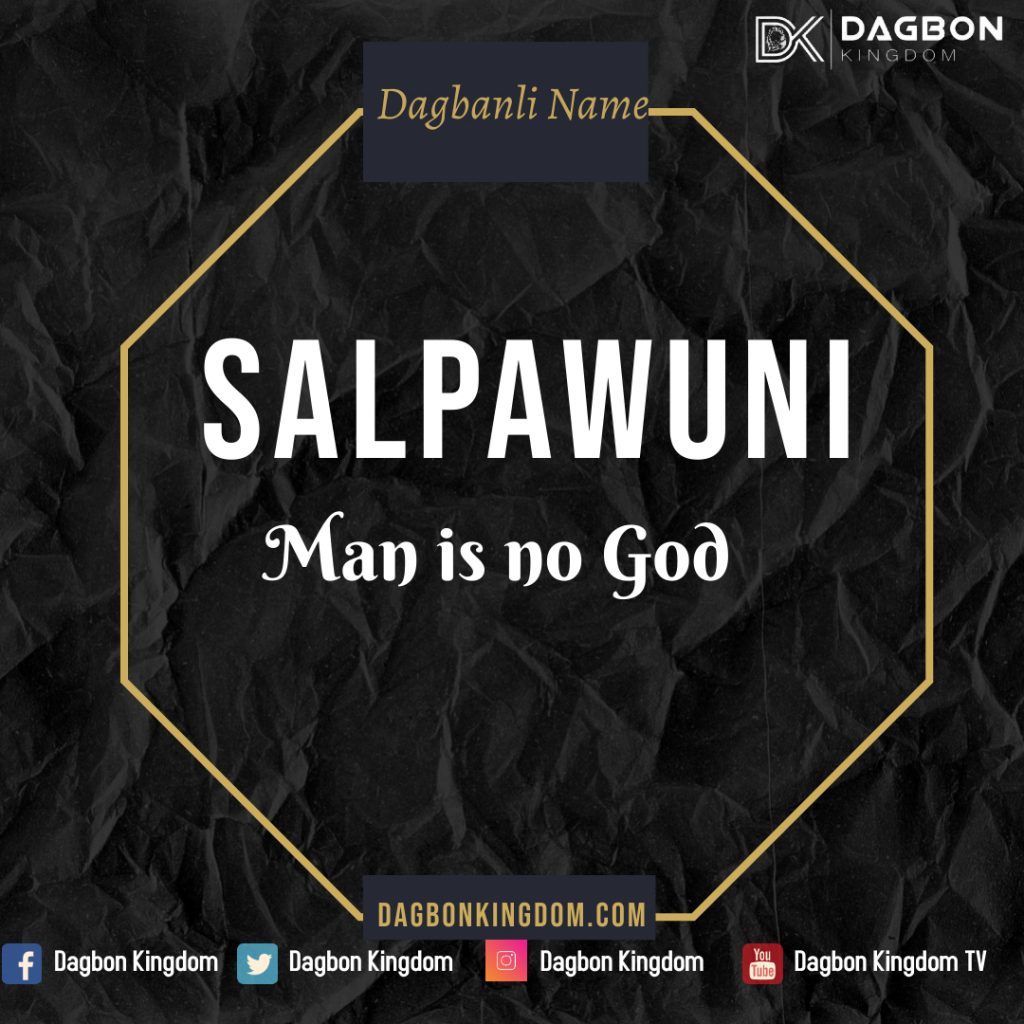
Bugum Festival: The Bugum festival ( Buɣim chuɣu) among the Dagomba people :
Dagombas use several common themes and factors to name their children. Some of these categories include:
1. Dabisa Yuya
2. Chira Yuya
3. Ŋaha Yuya
4. Naawuni Yuya
5. Saha Yuya
6. Buɣ’ Yuya
7. Dɔɣirikpihiŋ Yuya
8. Jahi Yuya
9. Dagbon Kura Yuya
Dagbani Names Based on the Day of Birth – Dabisa Yuya
In Dagbon culture, naming traditions hold great significance, particularly when it comes to assigning names based on the day of a child’s birth. This practice reflects the belief that a person’s birthday influences their character traits and destiny. These names, although not exclusively, are more commonly given to female children, emphasizing the cultural importance placed on lineage and heritage.
This unique naming tradition provides a deeper connection between individuals and their birthday, as each day carries its own symbolism and qualities. Here are some examples of such names:
Dagbon Hats: The Traditional Dagbon Hats: Types, How It’s Worn And Its Significance In Dagbon Kingdom
Dabisa – Days of The week in Dagbani and their corresponding Name
| Days of the week in English | Dabisa (Days of The week in Dagbani) | Dabisa Yuya (Corresponding Dagbani day name) |
| Monday | Atani | Tani (female) |
| Tuesday | Atalaata | Zilaata ( female) |
| Wednesday | Alaaba | Laaba |
| Thursday | Alaamishi | Laamihi |
| Friday | Alizumma | Azindoo -male Azima or Azim paɣa (female) |
| Saturday | Asibiri | Sibi-doo ( male) Sibi-paɣa ( female |
| Sunday | Alahari | Lahari ( Female) |
Dagbani Names Based on the Month of Birth – Chira Yuya
Within the Dagomba calendar, consisting of twelve months, only two are assigned as names for children. These months are Damba and Chimsi, corresponding to the 3rd and 12th months respectively. No other months are used for naming children in Dagbon. However, children born on the day of the Buɣim festival (fire festival) are given the name Asuro.
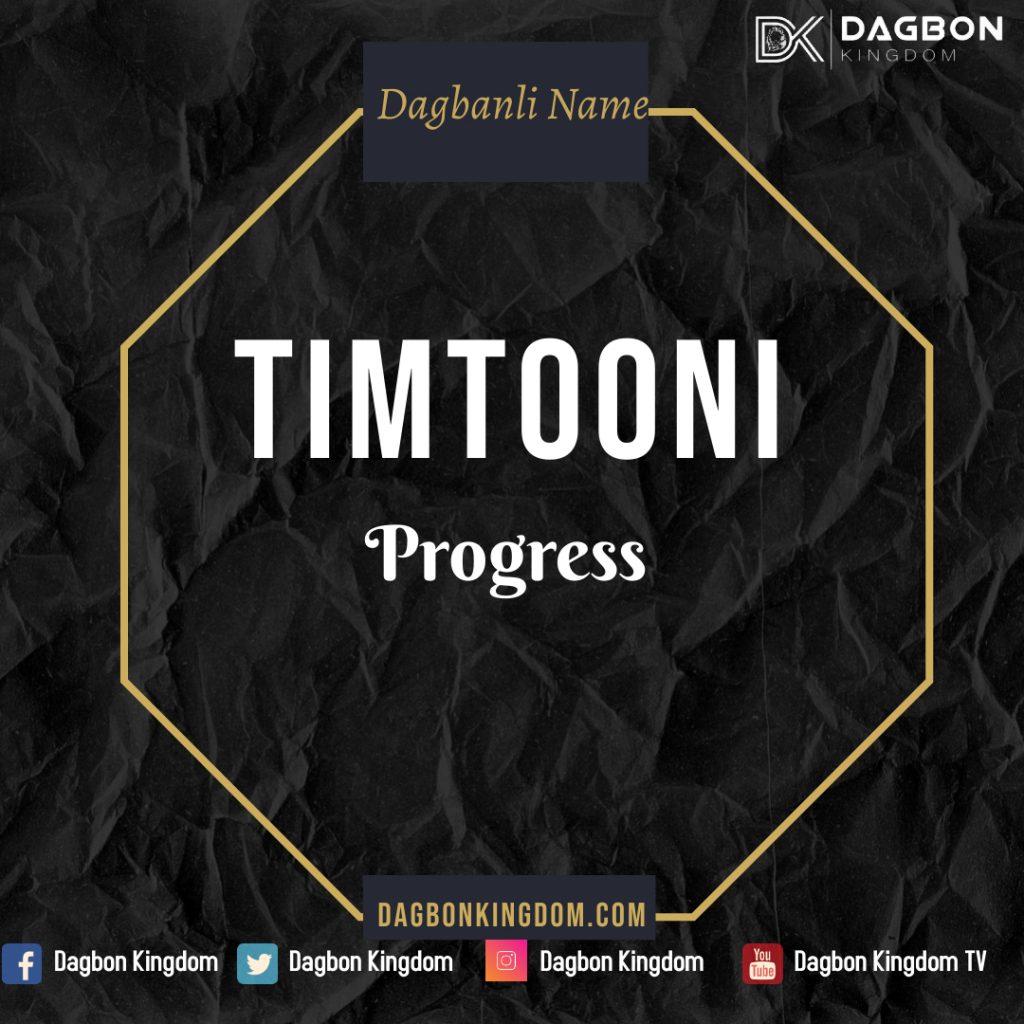
Bang gari: The Bang Gari; Dagbon’s Unique Quantum Metallic Bracelet
Dagbani Proverbial Names – ŋaha yuya
Proverbial names are the most prevalent in Dagbon. Parents choose these names to convey indirect messages to the public or specific individuals. Some proverbial names express good wishes for the newborn, envisioning blessings for the family, while others carry messages intended to mock enemies. Sometimes, these names are also chosen based on the challenges the mother faced during pregnancy. Depending on the meaning and purpose behind a proverbial name, it may attract either more admirers or enemies to the newborn.
Below is a list of some Dagomba names and meanings:
| Dagbani Name | Meaning In English |
| Anzansi | Courage /perseverance. |
| Balima | Persuasion. |
| Bangahim | Unique/distinguished |
| Baŋbebu ( Bangbebu) | Live cautiously. |
| Beninya | Live to witness. |
| Bɛneeti | They have awakened us |
| Bɛgaŋ | Not discriminatory |
| Bonsuduŋ | Why the hatred? |
| Chalipang | Forgive |
| Dipantiche | It will stop one day |
| Daliri | Good fortune |
| Dangana | Consolation |
| Deeshini | persevere/endure in silence |
| Faako | Relieve |
| Jilima | Respect |
| Kasi | Tidy |
| Kataali | Innocent |
| Manfooya | I have kept silent |
| Mbaŋba ( M | bang |
| ba) | I have found them out |
| Mandeeya | I have accepted |
| Malititi | Resolve for us / make things good for us. |
| Mbo | Well done |
| Mburidiba | My innocence has caused their destruction. |
| Mpanko | I’m not alone |
| Naani | Trust |
| Nasara | Victory |
| Neesim | Enlightenment/brightness |
| Nirilim | kindness/goodness |
| N nyeyem | I have become sensible |
| Ngaŋ ŋuni | I discriminate against no one |
| puumaaya | The pain is gone |
| Shini kadoliba | follow them in silence |
| Suhuyini | Faithfulness |
| Saha | Good luck |
| Suglo | patience |
| Tiyumba | Lets love them |
| Tiyuuniba | We’re watching them. |
| Tuŋteeya ( Tungteeya) | the family has grown |
| Tahama | Hopeful |
| Tifɔmi | We’re silent |
| Timtooni | progress |
| Tipaɣiya( Tipagya) | We are grateful |
| Viɛlim ( vielim) | Beauty |
| Vikuba | they’ve died of shame |
| vinikuba | They’ll die of shame |
| Yumzaa | Love all |
| Ʒisuŋ | Good life |
| Zaa nyaya | Everyone has seen |
| Zoosim | Greatness |
Dagbon Names relating to God – Naawuni Yuya:
Among the Dagomba tribe, there are common Dagbani names that bear a strong connection to God. These names are often given to children as a way of expressing gratitude to God for the blessing of a newborn baby. Furthermore, these names serve as prayers, seeking divine favor for the couple and their family. Here are some examples of these names:
Some of these names include ;
Dagbani Proverbs – 150+ List Of Dagomba Proverbs and Their Meaning
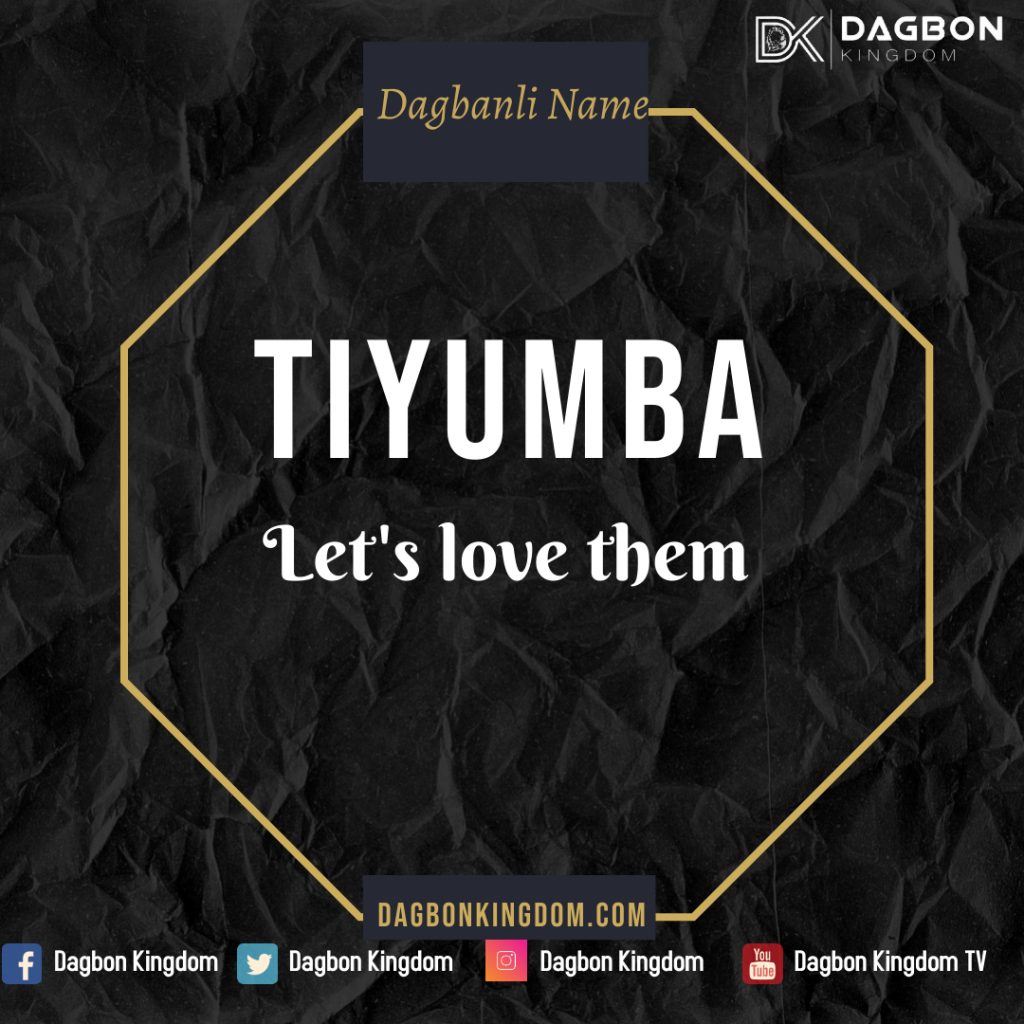
Dagbon Names relating to God – Naawuni Yuya
| Dagbon Names relating to God – Naawuni Yuya | Meaning |
| Chentiwuni | Entrust to God’s Hands |
| Salpawuni | Man is not God |
| Wunpini | God’s Gift |
| Wunimmi | Only God Knows |
| Wunnam | God’s Might |
| Wunniche | God’s Will |
| Wuntia | Faith in God |
| Wunibee | God Exists |
| Wunideeya | God Has Accepted |
| Wuniko | Only God |
| Wunizaligu | God’s Plan |
| Wunzooya | God is Great |
| Wunbiyɛli | It is not Ordained by God |
| Wunidabili | A Servant of God |
| Wunintira | God is the Giver |
| Anamzooya | You are a Mighty God |
These names encapsulate the deep faith and spiritual beliefs of the Dagomba people. They serve as a constant reminder of the presence of God in their lives and the importance of relying on divine guidance and protection. Through the act of naming their children with these meaningful names, the Dagomba community upholds their religious traditions and instills a sense of reverence for God from an early age.
The significance of these names goes beyond mere labels; they carry a profound spiritual essence that shapes the identity and values of the individuals who bear them. They represent the enduring connection between the Dagomba people and their faith, as well as their acknowledgment of the role played by God in their daily lives.
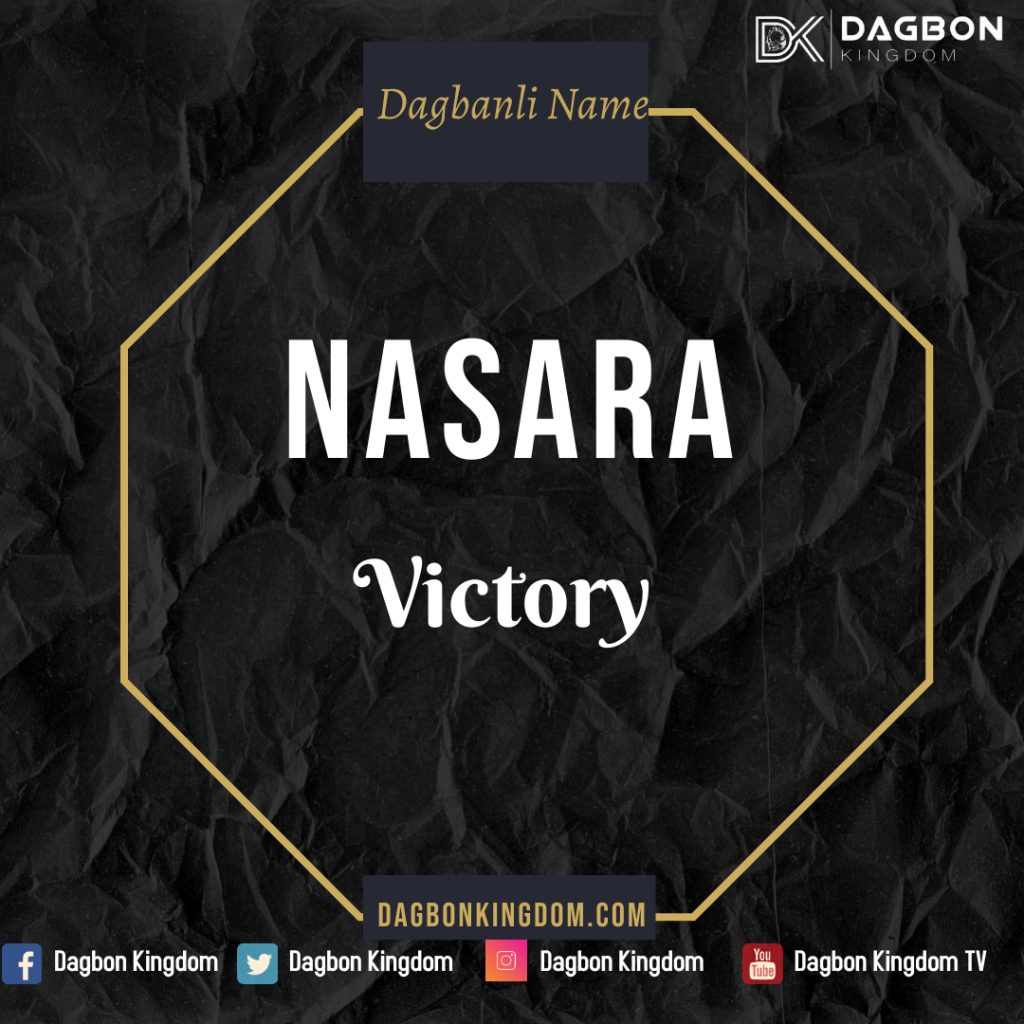
Lunsi: The advent of the lunsi in Dagbon State
Dagbon Names Based on the Situation or Time of the Child’s Birth – Saha Yuya:
The Dagomba people have a tradition of naming children based on the specific circumstances or time of their birth. These names reflect the unique events or situations surrounding the child’s arrival. Here are some examples:
| Saha Yuya | Meaning |
| Asuro | A child born on the day of the Buɣim festival. |
| 2. Dasana | A child born in the market. |
| 3. Dasoli | A child born on the way to the market. |
| 4. Dayuuni | A child who spent a year in the mother’s womb before birth (12 months). |
| 5. Gariyuuni | A baby who spent more than a year in the mother’s womb. |
| 6. Kayeba | A child born after the death of all grandfathers. |
| 7. Kachaɣu (Kachagu) | A child born during the season of harvesting Guinea corn. |
| 8. Napari | A child born after twins. |
| 9. Niendoo/Nienpaga | Born on a bright day (during the day). |
| 10. Saa | Rain (when a child is born during rainfall). |
| 11. Sawalli | A child born during a light rain cloud. |
| 12. Suɣuri (Sugri) | The first child to be born when a person becomes a Chief. |
| 13. Siɣili (Sigli) | A child born during the early rains of the wet season. |
| 14. Tisua | A child born in the middle of the night. |
| 15. Ʒiba | A child born after the death of their father. |
| 16. Zama | A child born on a day of festivity (festival). |
| 17. Ziŋnaa | A chief dies, and his wife gives birth after his death. The baby can be named Ziŋ Naa. |
These names carry significant meaning and serve as a reminder of the unique circumstances surrounding the child’s birth. They provide a connection to specific events, traditions, or cultural practices within the Dagomba community. By bestowing these names upon their children, the Dagomba people celebrate and honor these special moments in their lives.
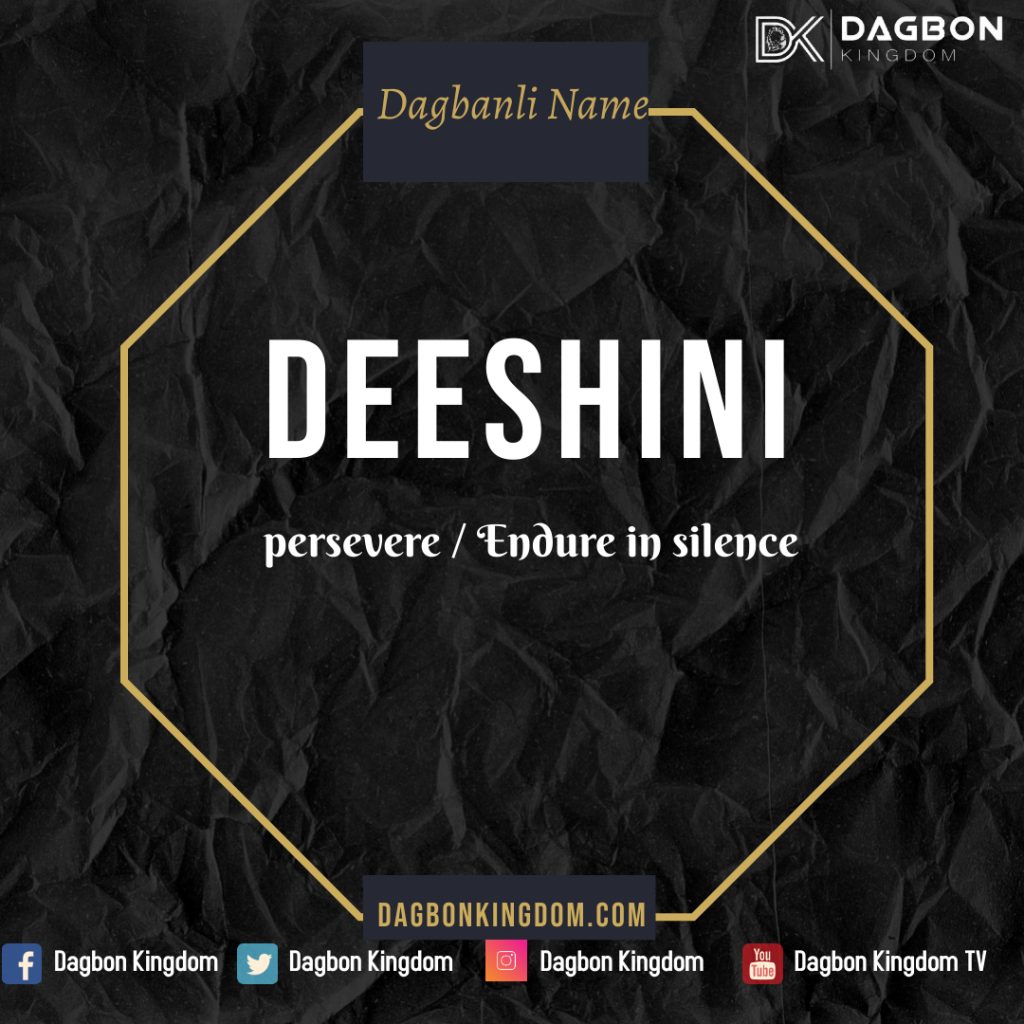
Dagomba Names of Deities – Buɣ’ yuya (Bug yuya):
In the traditional beliefs of the Dagomba people, deities and principalities held significant importance before the introduction of the Islamic religion. Each household maintained a family deity called “tiya,” while various community deities were revered throughout the land. Even in present times, these deities continue to hold great value in most Dagbon traditional areas, and they are honored by both chiefs and commoners.
Visiting these community deities to seek assistance for personal, familial, and communal matters was a common practice. Couples who struggled to conceive would often visit these deities to seek their blessings and the gift of a child. When their wish was granted and a baby was born, they would bestow the name of the deity upon the child as an expression of gratitude.
Here are some common Dagomba names associated with deities that you will come across in Dagbon society:
1. Budaali
2. Buɣu’jaa (Bugu jaa)
3. Buɣili (Bugu doo/Bugu paga)
4. Buɣu saɣiri (Bugu Sagiri)
5. Jaagbo
6. Jabuni
7. Kpala
8. Lansa
9. Laasichɛ
10. Nasaɣiri (Nasagri)
11. Tambo
12. Tia (Tidoo, Tipaga)
13. Tɔŋ (Tong doo, Tong paga)
These names carry the essence of the deities they represent and reflect the deep-rooted spiritual beliefs of the Dagomba people. They serve as a connection to their ancestral traditions and the reverence they hold for these deities in their cultural practices.
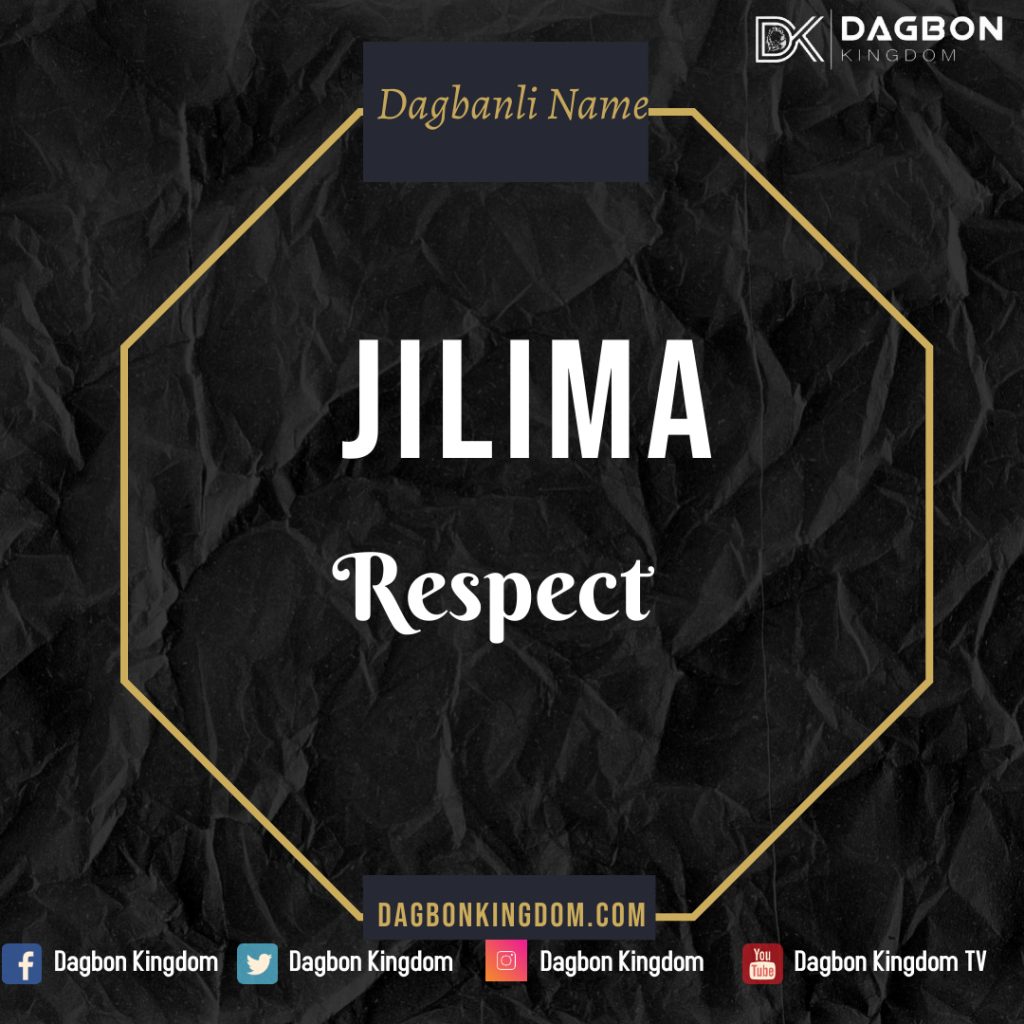
Dagomba Names of reincarnated children- Dɔɣirikpihiŋ yuya ( Dogri kpihing yuya)
As posited earlier, the Dagbamba people have a very strong belief in the concept of reincarnation. They
As previously mentioned, the Dagomba people hold a strong belief in the concept of reincarnation, known as “Dɔɣirikpihim” (Dogri-kpihim). According to this belief, there are children who intentionally cause distress to their mothers by dying and being reborn.
Such babies, if identified, are “sold” ( A rite performed and not sold permanently) to a person from another tribe. The baby is then given a name from that tribe, as it is believed that bestowing the child with a different tribal name will help ensure their survival.
Here are some common Dagomba names given to these reincarnated children:
1. Modoo/Mopaɣa (mopaga)
2. Gurindoo/Gurinpaɣa (Gurinpaga)
3. ŋmampiri doo
4. Zabaɣa doo/Zabaɣa paɣa
5. Fulani doo/Fulan paɣa
6. Kusa doo/Kusa paɣa
7. Alabaani
8. Bɛje
9. Tampuli
These names reflect the belief that by associating the child with a different tribe through their name, they will be protected from the challenges they faced in their previous life. It is a unique cultural practice rooted in the Dagomba’s understanding of reincarnation and their efforts to ensure the well-being of these special children.
Dagbani Names for Twins – Jahi yuya:
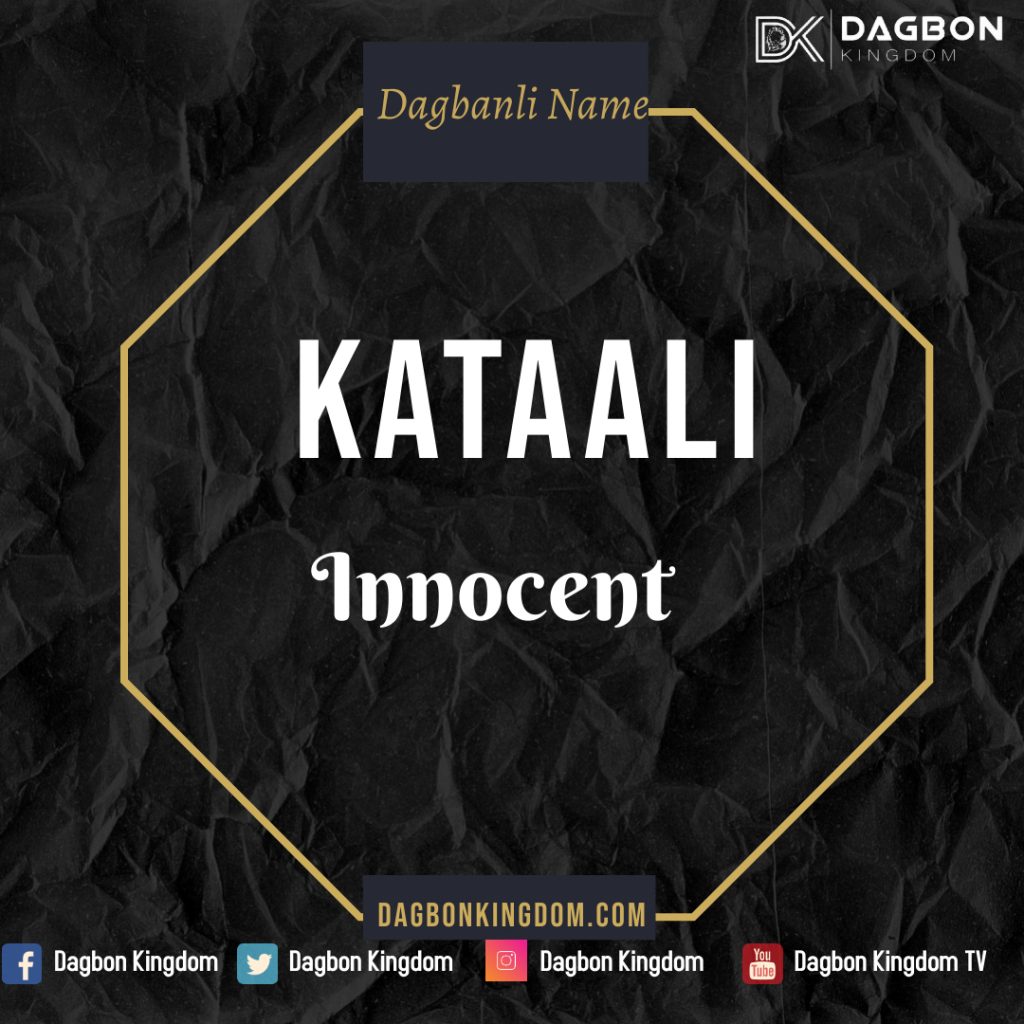
Twins hold a sacred status among the Dagomba people, as they are believed to embody certain spirits that can bestow blessings or curses. Due to this belief, twins are treated with special care and sometimes appeased in certain families.
According to Dagbon tradition, when twins are born, the first one to arrive is considered the youngest, while the second-born is considered the elder. It is believed that the elder twin sends the younger twin to explore the world before joining them.
Common Dagomba names given to twins include:
1. Dawuni – Danaa (both males)
2. Pagwuni – Pagnaa (both females)
3. Dawuni (male) – Pagnaa (female)
4. Danaa (male) – Pagwuni (female)
In this naming tradition, Danaa and Pagnaa are considered the elder twins, while Dawuni and Pagwuni are regarded as the younger twins.
These names signify the unique bond and hierarchical relationship between twins in Dagbon culture. The names reflect the belief in the spiritual significance of twins and the reverence accorded to them within the community.
Traditional Aboriginal Dagbon Names – Dagbon Kura Yuya
The rich history of Dagbon is interwoven with the legacies of our forefathers, who laid the foundation for the thriving Dagbon Kingdom we know today. Among their numerous contributions, the names they bore hold special significance, reflecting their roles as kings and leaders. These traditional Aboriginal Dagbon names, known as “Dagbon Kura Yuya,” encapsulate the essence of our cultural heritage and pay homage to the revered ancestors who shaped our community.
While these names may not be as commonly used in contemporary times, they serve as a reminder of the esteemed lineage from which we descend. Each name carries a unique story and represents the noble qualities and virtues cherished by our forefathers. They evoke a sense of pride and connect us to our ancestral roots, preserving the legacy of those who established and governed the Dagbon Kingdom.
These traditional Aboriginal Dagbon names are a testament to the enduring traditions and values that have shaped our identity as a people. By honoring these names and acknowledging their historical significance, we pay tribute to the resilience, wisdom, and leadership of our past rulers, ensuring that their contributions are never forgotten in the tapestry of our cultural heritage.
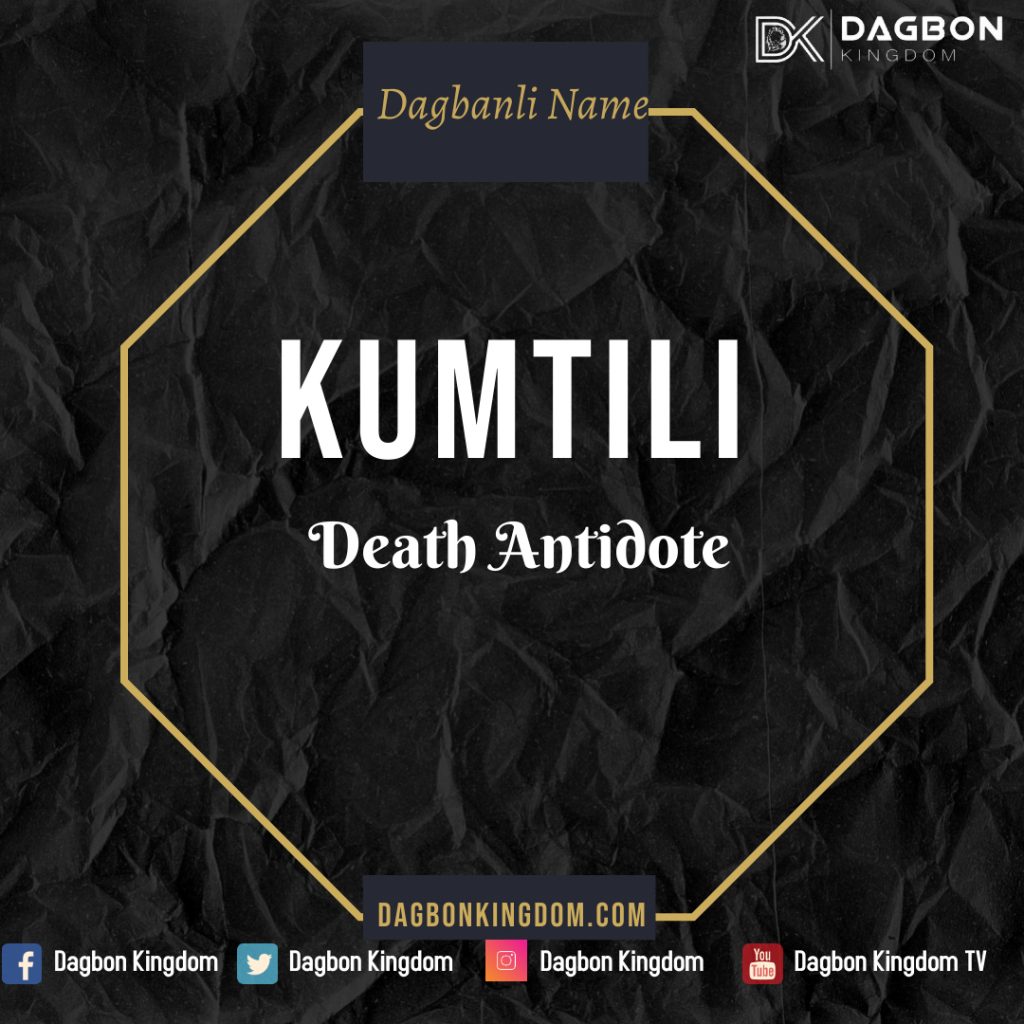
1. Banzu
2. Balimini
3. Birigiyomda
4. Dariʒiɛɣu
5. Datorili
6. Dimani
7. Fɔɣu
8. Shagbaa
9. Shitɔbu
10. Kumtili
11. Nadima
12. Nyagsi
13. Sindoliwa
14. Zanjina
15. Zagli
16. Gungɔbili
17. Yɛnzoo
18. Ʒipupɔra
19. Zirili
20. Zoligu
21. Zulandi
Dagomba Names with Islamic Influences
With the influence of foreign cultures, particularly the Islamic religion, many Dagomba people now bear names such as Adam, Haruna, Inusah, Alhassan, Ali, Zeinab, Hasana, Jamila, and others. Some of these names have been modified for easier pronunciation, while others come with additional appellations.
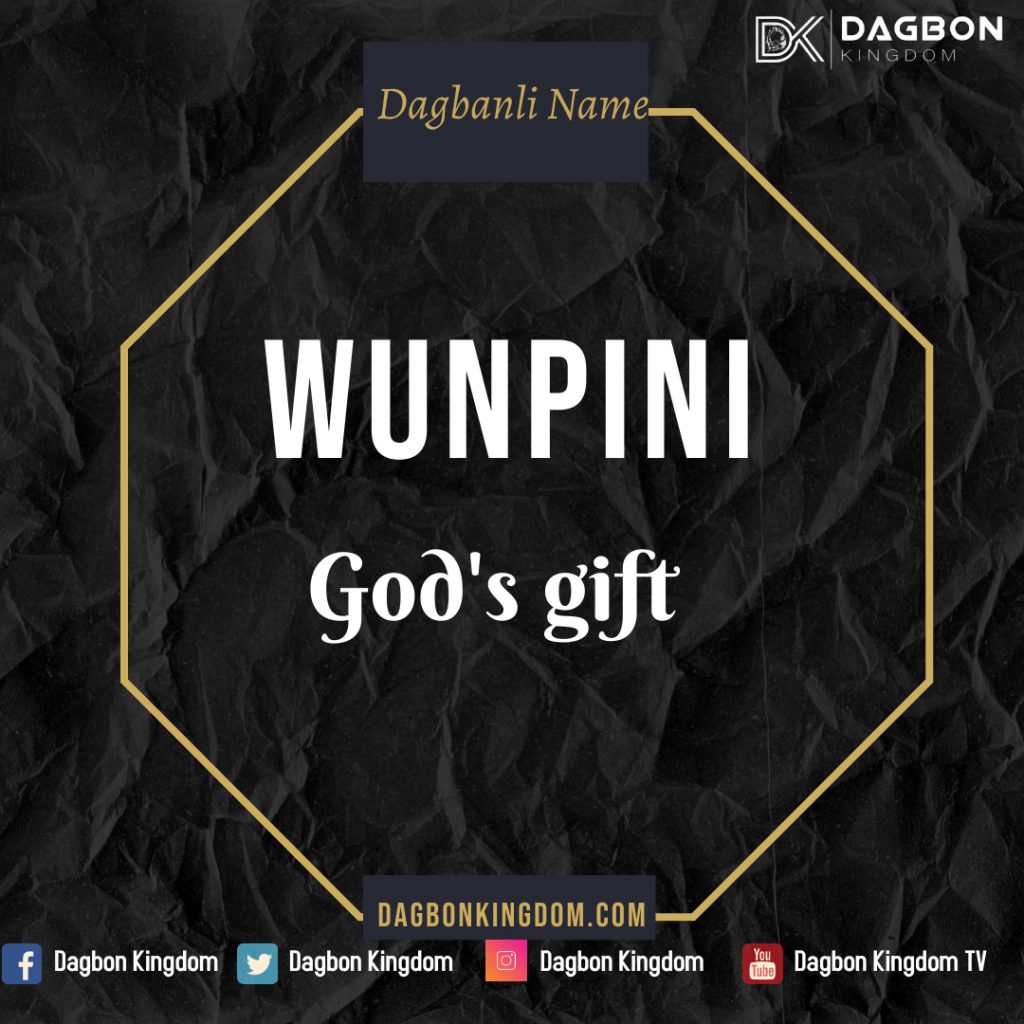
Here are some common Dagbon names along with their appellations:
| Alhassan (formerly Alaasani) | Karikari Baako |
| Abdullai (formerly Ablai) | Tooka |
| Hussein (formerly Fusheni) | Juuna |
| Mohammed (formerly Mahamaru) | Zanjina/Mankaanu |
| Yakubu | Gubili |
| Zeinab (formerly Ʒenabu) | Gadabisi |
| Rahama | Dahama Lana |
| Azima | Kaɣali Piɛɣu Ku Pili Ŋmani |
| Sulemana | Bindawudu |
| Adamu | Katakule |
| Hawa (formerly Awaabu) | Ʒini Duu Ka Nya Ŋmariga |
| Laabi | Badawiya |
| Mariam (formerly Mariama) | Yɛmbu |
| Meemunatu | Baamunu |
| Abubakari | Gariba |
| Dawuda | Che Sua |
| Imoro | Guru |
| Sayibu | Zunzɔŋ |
| Musah | Kalaamulahi |
These names reflect the integration of different cultural influences in Dagbon, with the adoption of Islamic names alongside traditional Dagomba names. The appellations further add meaning or significance to the names, emphasizing certain traits or beliefs associated with the individuals.
200+ List of Dagbani Names and Their Meanings
| Name In Dagbanli | Gender | Group | Meaning |
| Aburu | |||
| Adirikarili | |||
| Adishiri | |||
| Adishiri | |||
| Ajuwa | |||
| Alheri | |||
| Anamzooya | |||
| Andani | |||
| Andi | |||
| Anfani | |||
| Anim | |||
| Anisung | good intention | ||
| Anzansi | |||
| Asana | |||
| Asiro | Saha Yuya | ||
| Azima | Dabsa Yuya | ||
| Azindoo | |||
| Balemini | Ancestral | ||
| Balima | |||
| Banbangtaba | those who know each other | ||
| Bandaba | |||
| Bangahim | |||
| Bangbebu | |||
| Bangda | |||
| Bangsim | |||
| Banzu | Ancestral | ||
| Beemoni | Saha Yuya | ||
| Beninye | stay and witness | ||
| Bieŋmali | Saha Yuya | ||
| Bigaŋ | Ŋaha Yuya | Not discriminated | |
| Bineti | they have enlightened us | ||
| Biziŋ | |||
| Biʒem | |||
| Bonidima | |||
| Bonnidima / Dondirima | Ŋaha Yuya | ||
| Borizama | |||
| Budaali | Buɣi Yuya | ||
| Buɣijaa | Buɣi Yuya | ||
| Buɣili | Buɣi Yuya | ||
| Bugudabila | Buɣi Yuya | ||
| Buɣudabili | Buɣi Yuya | ||
| Buguli | Buɣi Yuya | ||
| Buɣutandi | Buɣi Yuya | ||
| Buɣuyɛligu | Buɣi Yuya | ||
| Busaɣiri | Buɣi Yuyaf | ||
| Chaanga | |||
| Chalpang | |||
| Changona | |||
| Chentiwuni | |||
| Chimsi | Goya Yuya | ||
| Daajuɣu | Saha Yuya | ||
| Daanaa | |||
| Daangoɣu | Ŋaha Yuya | ||
| Daankali | |||
| Daballi | |||
| Dahama | |||
| Daliri | |||
| Damba | Goya Yuya | ||
| Damduu | |||
| Danaa | Saha Yuya | ||
| Dangana | |||
| Dariʒieɣu | |||
| Dasana | |||
| Dasoli | Saha (Circumstantial) | ||
| Datia | |||
| Datorili | |||
| Dawora | Ŋaha Yuya | ||
| Dawuni | |||
| Dayuuni | Saha Yuya | ||
| Dede | |||
| Deeshini | |||
| Dikpong | |||
| Dinnani | Ŋaha Yuya | ||
| Dintoli | |||
| Dinviela | |||
| Dipantiche | |||
| Dirli | |||
| Faako | |||
| Fanjima | |||
| Fibili | |||
| Fiiluwa | |||
| Fuseina | |||
| Fuseini | |||
| Gariba | |||
| Gburiŋ | |||
| Gurimachaɣupaɣa | Dɔɣirikpihim Yuya | ||
| Gurimpaɣa | Dɔɣirikpihim Yuya | ||
| Hikolana | |||
| Jebuni, | Buɣi Yuya | ||
| Jemda | |||
| Jenda | It means Outstanding or exceptional when used as a verb, but when used as a noun it means responsibility | ||
| Jepu | |||
| Jilma | |||
| Jintora | |||
| Kachaɣu | |||
| Kacheli | |||
| Kaɣili | |||
| Kanli | |||
| Kasi | |||
| Kasuwa | |||
| Kataali | |||
| Katari | |||
| Kawoligili | |||
| Kayaba | Saha zooYuyazin | ||
| Kochim | |||
| Kokura | |||
| Kpala | Buɣi Yuya | ||
| Kuɣuli | |||
| Kumtili | |||
| Laakala | |||
| Lahari | |||
| Lansa | Buɣi Yuya | ||
| Lariba | Dabsa Yuya | ||
| Lasiche | |||
| Luro | |||
| Malima | |||
| Malimaŋa | |||
| Malisimli | Ŋaha Yuya | ||
| Maltiti | Ŋaha Yuya | ||
| Mandeiya | |||
| Matta | |||
| M’baŋba | Ŋaha Yuya | ||
| Mbatɔɣima | |||
| Mbo | |||
| M’buridiba | Ŋaha Yuya | ||
| Mfaanga | |||
| Mirifa | |||
| Mpanko | |||
| Naama | |||
| Naani | Ŋaha Yuya | ||
| Naatɔɣima | |||
| Nagumsi | |||
| Naina | |||
| Nakpambo | Ancestral | ||
| Naniendo | |||
| Nanjaa | |||
| Napaga | |||
| Napari | |||
| Naporo | Ancestral | ||
| Nasakai | |||
| Nasara | |||
| Nayi | |||
| Nbangzaa | |||
| Ndaduŋ | |||
| Ndini | |||
| Neina | |||
| Neindoo | |||
| Neira | |||
| Neisim | |||
| Nenpaga | |||
| N’gaŋŋuni | Ŋaha Yuya | ||
| Niema | |||
| Nirlim | |||
| Niyasung | |||
| Njalwuni | Leaning on God | ||
| Nniŋdini | |||
| Nnyeyam | |||
| Ntabiliba | Ŋaha Yuya | ||
| Nyaɣisi | |||
| N’yubaje | Ŋaha Yuya | ||
| ŋɔʒe | |||
| ŋmapiripaɣa | Dɔɣirikpihim Yuya | ||
| Paɣanaa | |||
| Paɣawuni | |||
| Pagnaa | |||
| Pini | |||
| Puumaya | |||
| Saa | Saha Yuya | ||
| Sachibu | |||
| Sagtiti | |||
| Saha | |||
| Saha | |||
| Sakundi | |||
| Salaŋa | Saha Yuya | ||
| Salpawuni | |||
| Sayora | Saha Yuya | ||
| Shagba | Ancestral | ||
| Sheriga | |||
| Shitobu | |||
| Sibido | Dabsa Yuya | ||
| Sibiri | |||
| Siche | |||
| Siɣili | Saha Yuya | ||
| Siisabigi | |||
| Simdi | |||
| Sindoliwa | Ancestral | ||
| Soochi | |||
| Suɣiri | Saha Yuya | ||
| Suglo | |||
| Suhidoo | |||
| Suhipelli | |||
| Suhiyini | Ŋaha Yuya | ||
| Taali-mbo | |||
| Tahama | |||
| Talaata | Dabsa Yuya | ||
| Tamaha | |||
| Tambo | Buɣi Yuya | ||
| Tampuli | Dɔɣirikpihim Yuya | ||
| Tani | Dabsa Yuya | ||
| Tapilimpaɣa | Dɔɣirikpihim Yuya | ||
| Tasalla | Saha Yuya | ||
| Teenaba | |||
| Tia | Buɣi Yuya | ||
| Tidiya | |||
| Tido | Buɣi Yuya | ||
| Tikuli | |||
| Tikuma | Ŋaha Yuya | ||
| Timani | |||
| Timtooni | Ŋaha Yuya | ||
| Tinitoo | |||
| Tipaga | Buɣi Yuya | ||
| Tipaɣa | |||
| Tiyumba | |||
| Tiyuundiba | |||
| Toblanguri | |||
| Tunteiya | |||
| Tusua | Saha Yuya | ||
| Vabiloɣu | Saha Yuya | ||
| Vani | |||
| Velim | |||
| Wumbei | |||
| Wumda | |||
| Wumpini | |||
| Wumpini | |||
| Wundeiya | |||
| Wunibiyɛli | |||
| Wuniche | |||
| Wuninmi | Ŋaha Yuya | ||
| Wunintira | Ŋaha Yuya | ||
| Wunko | |||
| Wunnam | |||
| Wunpini | |||
| Wuntia | |||
| Wuntima | |||
| Wunzalgu | |||
| Yada | |||
| Yaɣimerigu | |||
| Yalsumah | |||
| Yemtori | |||
| Yemusa | |||
| Yerda | |||
| Yiko | |||
| Yiri | Ancestral | ||
| Yirifa | |||
| Yumzaa | |||
| Yumzaa | |||
| Yurizaa | |||
| Zabaɣapaɣa | Dɔɣirikpihim Yuya | ||
| Zambalima | Dɔɣirikpihim Yuya | ||
| Zantale | |||
| Zemoli | |||
| Zenebu | Buɣi Yuya | ||
| Ziŋba | |||
| Ziŋnaa | Saha Yuya | ||
| Zirili | |||
| Zitana (Ʒitana) | |||
| Ziyaba | |||
| Zoli | |||
| Zoosim | |||
| Zoosimli | Ŋaha Yuya | ||
| Zugsung | |||
| Ʒeenya | |||
| ʒiba | |||
| Ʒisuŋ |
FAQs on Dagbani Names and Their Meaning:
- Why are names so important in Dagomba culture?
Names hold significant importance in Dagomba culture as they are believed to shape a person’s identity and reflect their cultural heritage. They carry deep meanings and connect individuals to their lineage, ancestors, and community.
- How are Dagbani names chosen for newborns?
Dagbani names are typically chosen based on various factors. These include the day or circumstances of the child’s birth, cultural traditions, family preferences, and the desired characteristics or aspirations associated with the name.
- Are there specific names reserved for certain days or circumstances of birth?
Yes, in Dagomba culture, certain names are associated with specific days or circumstances of birth. For example, children born on the day of the Buɣim festival are given the name “Asuro,” while names like “Chira” and “Damba” are reserved for children born in the 3rd and 12th months respectively.
- What is the significance of the naming ceremony in Dagomba culture?
The naming ceremony is a significant event in Dagomba culture. It is a time for family, friends, and community members to come together to celebrate the arrival of a newborn and officially introduce the child to the world. It is also an opportunity to honor cultural traditions, seek blessings for the child’s future, and reinforce the family’s ties to their heritage.
- How have modern influences impacted Dagbani naming practices?
Modern influences have introduced a wider range of naming options among Dagomba people. While traditional Dagbani names are still prevalent, individuals may also choose names from other cultures or use modified versions of traditional names to suit personal preferences or incorporate elements of modernity.
- Can Dagombas choose non-traditional names for their children?
Yes, Dagomba parents have the freedom to choose non-traditional names for their children if they wish. While traditional names hold cultural significance, individuals may opt for names from other cultures, names with personal meanings, or names that reflect their religious beliefs or aspirations.
- Are there any naming taboos or restrictions in Dagomba culture?
Dagomba culture has certain naming taboos and restrictions. These may vary among different clans or families. Some taboos may include avoiding the use of names associated with negative historical events, names that carry negative connotations, or names that are believed to bring bad luck or misfortune.
- Are there any rituals or blessings performed during the naming ceremony?
During the naming ceremony, various rituals and blessings are performed to invoke the protection and guidance of ancestral spirits and seek blessings for the child’s well-being and future. These may include prayers, pouring of libations, recitation of ancestral lineage, and the involvement of elders and community members in offering their blessings and well-wishes.
- What are the names for boys in Dagomba?
Some common names for boys in Dagomba culture include Maltiti, Kasi, Timtooni, Dikpong, Wunpini, and Dagara. These names often carry cultural and religious significance within the Dagomba community.
- What is the naming ceremony in Dagomba?
The naming ceremony in Dagomba culture is a special event held to officially introduce a newborn to the community and bestow a name upon the child. It is a joyous occasion where family members, friends, and community members gather to celebrate the birth and bless the child’s future. The ceremony may involve prayers, blessings, recitation of ancestral lineage, and the sharing of food and gifts.
- Who is the God in Dagbani?
In Dagbani culture, the concept of God is referred to as “Naawuni.” Naawuni is the Supreme Being and is believed to be the creator of the universe. Dagombas hold a strong belief in the power and presence of Naawuni in their lives.
- How do Dagombas call their God?
Dagombas address their God, Naawuni, through prayers and supplications. They offer praises and express their devotion and gratitude to Naawuni. The specific prayers and rituals may vary, but the underlying belief is that Naawuni listens to the prayers of the faithful and provides guidance and protection in their lives.

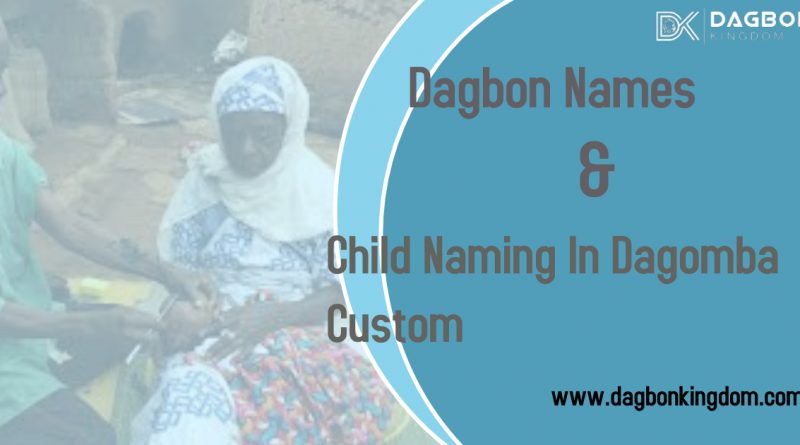
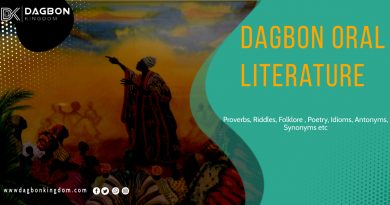
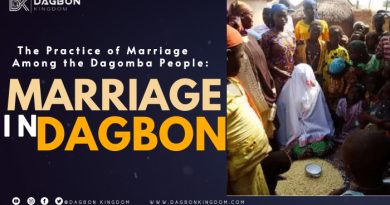
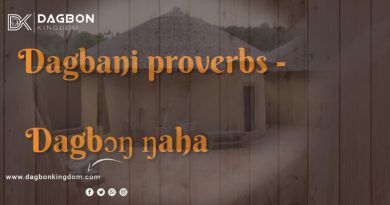
Pingback: The Northern Ghana Tourism Development Strategy: A Dagbon Perspective. • Dagbon kingdom
Pingback: The Bugum festival ( Buɣim chuɣu) among the Dagomba people : • Dagbon kingdom
Pingback: Names of Animals in Dagbani Language • Dagbon kingdom